Young people need support to break cycle of crime
Too many vulnerable young South Australians end up in detention, writes Andrea Michels – and instead of casting judgment, the community must help them change the course of their lives.


It's heartbreaking to see a vulnerable child take a wrong turn. Photo: AAP
Walking around our great city always makes me think how lucky we are. Few of us have ever experienced war, having to run from our homes in fear for our lives, extreme poverty or violence, or the downward spiral of drug abuse.
However, many of my colleagues in the law have worked with marginalised people in South Australia who are not so lucky.
It’s harrowing enough to hear about such cases, let alone to imagine what it’s like for the people living those lives.
It’s especially hard when those concerned are juveniles – some as young as 10.
A complex cocktail of social and economic factors can see a vulnerable child take the wrong turn and soon they are repeatedly up against the criminal justice system, and in many cases facing the prospect of youth detention.
In the 2016-2017 year, 388 young people were put in detention in SA, many of them more than once. More than half were indigenous children.
A desire to help those children turn their lives around is why I got involved with the local not-for-profit group Fearless Theatre. Here, professional artists are working with marginalised young people from a diverse range of cultural backgrounds to bring hope, and to challenge the views of mainstream society about kids who have lost their way.
Why bother? Because it’s just too easy for those of us with a nice life to sit around casting judgment and labelling young offenders as no-hopers. Yes, some of them have done terrible things and the legal system quite rightly delivers consequences. But we also need to believe in redemption.
To see these kids in a detention environment is heartbreaking. As a mother of two young boys myself, I just can’t comprehend how children are allowed to get into that situation.
Evidence shows what these young people need more than anything is encouragement and support to help get their lives back on track.
Turnarounds are possible. How many celebrities do we know with a compelling backstory? Mark Wahlberg, Pink and our own Jimmy Barnes have all admitted they had extremely rough starts in life, including many run-ins with the law. (Mark Wahlberg was sentenced to two years in a youth correction facility when he was just 16.) But they pulled out of it, didn’t they?
The point is it was not their celebrity, but their resilience and the support they were able to access along the way that got them through.
In many cases, the turning point comes in finding a connection to a creative outlet. That’s why projects run by SA community groups like Fearless Theatre (and others) can help steer young people away from crime towards another path.
Involvement in the arts – whether it’s theatre, dance or music – helps build self-esteem, confidence, the ability to work in a team, and the courage to trust again.
The Fearless Theatre students, many of whom are indigenous, have found a channel to tell their stories for the first time, to express their emotions in a positive way and to make new friendships that will help support them in the tough times.
We need to break the cycle of violence early and we need sustained intervention from a wide network …
Last month I attended the final performance of a work devised by the students about drugs and alcohol-related youth violence, inspired by a presentation they had seen by the Sammy D Foundation.
For the students, the experience was another of many “firsts”. It was the first time any of the students had completed a detailed piece of creative work, the first time they had walked onto a stage with an audience, and the first time anyone had ever applauded their efforts.
The performance, titled One Hit Road, reflected various hidden talents and included original music, rap songs, video and special effects. The effect was raw, authentic, and heartfelt. Real story-telling about real lives.
Knowing the back-stories of all the students, there wasn’t a person in the room who wasn’t inspired by the performance and the ability of the students.
Theatre, I hope, will allow them to begin the journey to a good place.
So, next time you read about misbehaving kids who are ruining our roads or terrorising neighbourhoods, think carefully about what the community can do to break the cycle of violence and to stop these serious behavioural issues. Supporting local organisations that work with these kids could be a good start.
Locking young people up with no support certainly isn’t the answer. We need to break the cycle of violence early and we need sustained intervention from a wide network of family, teachers, lawyers and other parts of the community.
We have to believe there’s always an opportunity to empower these kids to change the course of their lives because, at the very best, they deserve us trying.
Andrea Michaels is a tax law and family business specialist and the managing director of Adelaide firm NDA Law. She’s also a board member of Fearless Theatre Inc.




